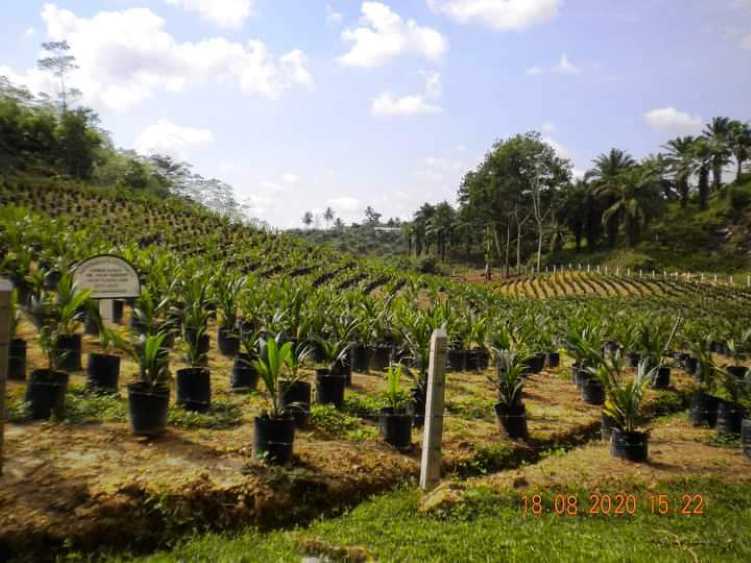
3rd October 2022: Since its genesis, the plantation sector in Sri Lanka has played an essential role in the island’s economy, with tea, and rubber serving as the backbone of this thriving sector. While recent fluctuations in commodity prices may have generated increased export values, the long-term viability of both crops continues to hang in the balance, bolstering the case for greater crop diversification.
One of the strongest success stories on crop diversification among Sri Lanka’s Regional Plantation Companies (RPCs’) is Namunukula Plantations PLC (NPL). Once considered among one of the weakest performing RPCs listed on the Colombo Stock Exchange (CSE), today the company is among the most consprofit-making plantation companies in Sri Lanka with the single highest share price on the CSE among the listed RPCs.
Valuing ‘The golden crop’
At the center of this transformation is a deeply misunderstood, and extremely lucrative crop: oil palm. Starting from the year 2000, NPL commenced a bold expansion of its sustainable oil palm, with the initial objective of supporting its other key crops: tea, rubber, coconut, and cinnamon.
However, according to NPL CEO, Prins Gunasekera, the value of the “golden crop” soon became apparent, as its earnings rapidly overtook all traditional crops as NPL grew to become Sri Lanka’s second largest producer of sustainable oil palm with over 2,508 Ha under cultivation.

While the past two years have been devastating for many sectors of the Sri Lankan economy, NPL posted some of its strongest financials over the past five years, based on the strength of its diverse export crop portfolio.
As the disruptions caused by the COVID pandemic worsened, NPL’s profit after tax expanded over 100% Year-on-Year (YoY) up to a record Rs. 863.2 million. Gunasekera credits NPL’s sustainable oil palm business, and the performance of its joint venture with Agalawatta and Elpitiya Plantations, AEN Palm Oil Processing with this remarkable result.
If the current oil palm ban is lifted, Gunasekera estimates that his company as well as the oil palm industry in Sri Lanka can generate a substantial profit from this sector whilst being able to generate much needed foreign exchange to the country.
A return to science-driven policy
Sri Lanka’s total oil palm cultivations span is less than 12,000 Ha and produces approximately 25000 MT of crude oil per annum. Locally produced palm oil contributes to US$ 27 million through import substitutions. Total oil requirement for edible and non-edible purposes of Sri Lanka is approximately 180,000MT per annum. Approximately 50000MT of the domestic oil requirement is locally produced by coconut and palm oil while the balance is imported at a cost of more than US$ 50 billion per annum.
“Oil palm is a crop which has been relentlessly demonized in Sri Lanka, with zero consideration to the science.
“At a time when the Sri Lankan economy is at its lowest point in our nation’s entire history, the value of sustainably cultivated oil palm is no longer a debate. All those who claim to oppose it need to look at the science and the numbers first,” Gunasekera notes.
Oil palm is considered controversial, primarily as a result of conditions in Malaysia and Indonesia. In those nations, the establishment of some of the world’s main sources of oil palm were preceded by large-scale deforestation of virgin forests, and catastrophic losses in biodiversity.
Conversely, in Sri Lanka, oil palm is exclusively grown as a replacement to unproductive rubber, meaning that deforestation is not a factor. Most of the other concerns raised by pressure groups opposing oil palm cultivation are peculiar to Sri Lanka including long debunked claims of increased fertilizer/moisture consumption relative to tea and rubber, and other contradictory allegations ranging from a loss in biodiversity to an increase in monkey and serpent populations, increased droughts, and increased flooding.
An Agri-balancing act
For NPL, several of their rubber cultivations suffered from low productivity due to excessive rainfall. According to Gunasekera, such conditions proved to be far more suitable for oil palm than rubber, which further reinforced the company’s decision to diversify uneconomical rubber land with oil palm.
“Now more than ever, the potential benefits of oil palm cannot be ignored. There is an urgent need to broaden the scope of the discourse on the subject,” Gunasekera stated.
“Its cultivation should be pursued sustainably, adhering to agricultural best practices. If cultivation can be expanded at a national scale, it can certainly produce as much oil palm for edible consumption instead of importing, making it a seemingly suitable substitute. The ban should be based on science. Given Sri Lanka’s reversal on the chemical fertilizer ban, the ban on oil palm deserves to be reconsidered, given its immense potential.”
While oil palm has played a pivotal role in the company’s performance, Gunasekera emphasized that at a strategic level, NPL is not aiming to shift completely into oil palm. Instead, the company plans to maintain a healthy balance between oil palm, tea, rubber, coconut, and cinnamon, while also exploring the potential for further crop diversifications, and strategic opportunities for vertical integration and domestic value addition, similar to the outstanding success of the AEN facility.
“Prior to the last two years, the performance of our other key crops has been a real challenge. However, we have since benefited from strong improvements in tea and rubber prices, and this has further accelerated our financial performance over the last year. But it has to be noted that the reason we were able to endure previous years with lower prices, in order to properly take advantage of the current market conditions is due to the revenue generated from oil palm.”
He noted that ultimately, such dynamics lead to positive impacts at a macro and micro-economic level. Today, NPL provides lucrative livelihoods to over 4,000 employees across Kalutara, Galle, Matara and Badulla.
In addition to competitive salaries, Namunukula offers other benefits including living quarters with modern facilities and transport facility to ease mobility. Further, the plantation funds scholarships to all of the children of their employees, providing them with essential support to achieve their higher education goals whilst contributing to support a wider estate population of 15,000.
This strategy of reinvesting profits earned from oil palm yields back into the business and its employees has proven successful given the resilience demonstrated by the Plantation during the COVID-19 pandemic and the prevailing severe economic crisis in Sri Lanka.
Their emphasis on sustainability goes beyond business interests as NPL commits considerable effort toward planting trees, utilizing unused land for planting crops, improving irrigation systems and prioritizing safeguarding biodiversity that exists in the plantation.



